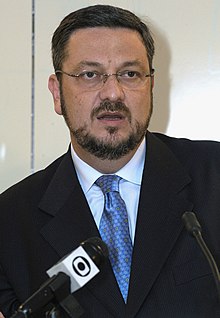Antonio Palocci
| Antonio Palocci | |
|---|---|
 |
|
| Chief of Staff of the Presidency | |
|
In office 1 January 2011 – 7 June 2011 |
|
| President | Dilma Rousseff |
| Preceded by | Erenice Guerra |
| Succeeded by | Gleisi Hoffmann |
| Member of the Chamber of Deputies | |
|
In office 1 February 2007 – 31 December 2010 |
|
| Constituency | São Paulo |
|
In office 1 February 1999 – 31 March 2000 |
|
| Constituency | São Paulo |
| Minister of Finance | |
|
In office 1 January 2003 – 27 March 2006 |
|
| President | Luiz Inácio Lula da Silva |
| Preceded by | Pedro Malan |
| Succeeded by | Guido Mantega |
| Mayor of Ribeirão Preto | |
|
In office 1 January 2001 – 31 March 2002 |
|
| Preceded by | Luiz Roberto Jábali |
| Succeeded by | Gilberto Maggioni |
|
In office 1 January 1993 – 31 March 1996 |
|
| Preceded by | Welson Gasparini |
| Succeeded by | Luiz Roberto Jábali |
| Member of a Legislative Assembly | |
|
In office 1 February 1990 – 31 March 1992 |
|
| Constituency | São Paulo |
| Personal details | |
| Born |
Antonio Palocci Filho 4 October 1960 Cosmorama, São Paulo, Brazil |
| Nationality | Brazilian |
| Political party | Workers' Party |
| Residence | Brasília, Brazil |
| Profession | Physician, politician |
Antonio Palocci Filho (born 4 October 1960) is a Brazilian physician and politician, and former Chief of Staff of Brazil under President Dilma Rousseff. He was the Finance minister of the Brazilian federal government from January 1, 2003 until March 27, 2006 (when he resigned in the wake of reports of conduct unbecoming of his office), during the presidency of Luiz Inácio Lula da Silva. He resigned from his office as Chief of Staff on June 7, 2011.
Raised in Ribeirão Preto, in the state of São Paulo. His father was an artist and teacher. During his youth as a medical student at the University of São Paulo’s Ribeirão Preto Medical School, Palocci took part in several radical movements. He was one of the founders of the Workers' Party and was its President in São Paulo from 1997 to 1998.
After graduation, Palocci worked for five years as a civil servant at the Ribeirão Preto regionel office of the São Paulo State Public Health Secretary. He inaugurated the Workers’ Health Ward and was the director of the regional office of the Public Health Service.
When Palocci was 28 years old, after occupying positions in various labour unions, including the CUT (linked to the Workers Party) he ran for election as city councilman (vereador) for the first time. Since then, Palocci has never lost an election. However, he completed only one of his terms (as mayor of Ribeirão Preto from 1993 to 1996).
...
Wikipedia
